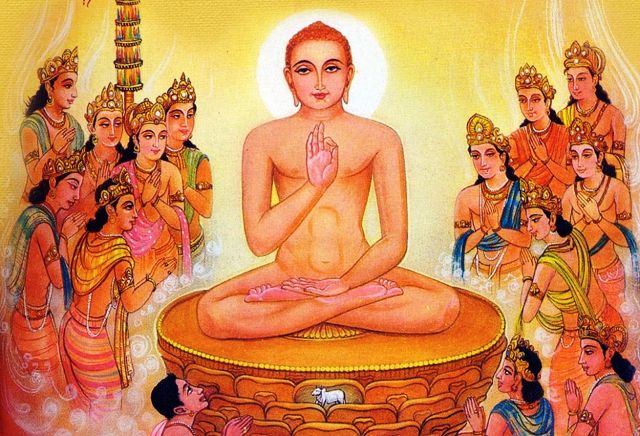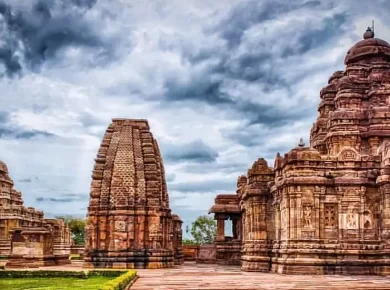Jainism
- Jainism is of ancient origin & believed to have 24 Tirthankaras / Great teachers in their religion
- 1st one was Rishabdev (Born in Ayodhya) who is said to have laid the foundation of orderly human society & realised that the source of Jaina philosophy was Adinath.
- 23rd was Parshavnath (Born in Varanasi) & Last and 24th was Vardhamana Mahavira (Born 540 BC at Kundangrama near Vaishali)
Vardhamana Mahavira
| Father | Sidhhartha | Head of Jnatrika Clan |
| Mother | Trishla | Sister of Lichchhavi chief chetaka, whose daughter married to Bimbisara |
|
Mahavira’s family was connected to royal family of Magadha |
||
- In search of truth Mahavira abandoned the world at the age of 30 & became ascetic & medicated for 12 years practicing austerities.
- In 13th year, at the age of 42, he attained Kaivalya (Juan) under Sal tree at Timbhikagrama
- Kaivalya > One who conquered misery & happiness > And because of this conquest he is known as Mahavira or great hero or jina (the conqueror) & his followers Jainas
- He propagated religion for 30 years & passed away at the age of 72 at Pavapuri near Rajgir
3 principles of Jainism > Triratnas
- Right faith (believe in teachings & wisdom of Mahavira)
- Right Knowledge (Acceptance of theory that there is no god & world has been existing without creator & all objects possess a soul)
- Right conduct (Refers to observance of 5 great vows)
- Ahimsa
- Satya
- Asteya (Not to steal)
- Parigraha (Not to acquire property)
- Brahamcharya (observe continence / not to led immoral life > added by Mahavira)
Teaching of Jainism
- Rejected the authority of Vedas & objected to Vedic rituals & sacrifices
- Even practice of agriculture was considered sinful as it caused injury to earth, worms & animals
- Doctrine of ascetism & renunciation was carried to great lengths by practice of starvation, Nudity & other form of self-tortures (Penance for all sins committed)
- Although Parvanath (23rd Teacher) asked people to cover their upper & lower body part but Mahavira asked them to discard cloths altogether (Extreme austerity)
- Mahavira did not condemn Verna system as Buddhism did as according to Mahavira, a person born in higher or lower verna is the consequences of the sins of past life & through penance & meritorious life they can attain liberation
- Jainism mainly aimed at freedom of Individual from worldly bonds
Also read: Jainism Buddhism and Mahajanpadas Rise of Magadha
Twelve small vows (anuvrats) of Jainism
Five anuvrats
- avoiding injury to mobile beings which have two or more senses or desisting from deliberate acts of violence
- truthfulness to avoid false statements out of extreme affection for someone or out of hatred for someone
- refraining from taking anything not given
- desisting from sexual relationship with anyone other than one’s spouse.
- voluntarily limiting the possession of all forms of assets
The Seven Supplementaries
- refraining from movement beyond a limited area
- restricting a movement to even a more limited area
- refraining from wanton destruction of the environment by thought, word or deed
- keeping aloof from a sinful conduct for a set period of time (observing samayik)
- fasting on sacred days and observing special restrictions at secluded places
- limiting the use of consumable and non-consumable goods
- Sharing your food or resources with guests or wandering ascetics.
Advertisement: World’s fastest hosting – secure, reliable, limited-time offer! Click now!
Spread of Jainism
- Admitted both women and shudras in its order of followers.
- Used Prakrit (common language) for preaching instead of sanskrit
- 200 years after the death of Mahavira, there was a serious famine in Ganga valley. Many Jain followers led by Chandragupta Maurya & Bhadrabahu left for south (Karnataka) & rest stayed back under the leadership of Sthalbahu. Emmigrants spread Jainism in south India.
- Meanwhile Sthalbahu changed the code of conduct for the monks which led to division of Jainism into 2 sects Swetambars (White clad / Northerners) & Digambars (Naked / Sky Clad / Southerners)
- 1st Jain council was held at Pataliputra led by Sthalbahu & 2nd was held at Valabhi where 12 Anagas of Swetambars were finally compiled
Contribution of Jainism
- 1st serious attempt to mitigate evil of verna system & ritualistic Vedic system.
- Adoption of Prakrit by Jainas helped in its growth & many regional languages grew out of Prakrit especially Shauraseni, out of which Marathi grew.
- Jainas composed earliest important work in “Apabhramsha” & prepared its 1st grammar.
- Jainism also contributed to the growth of Kannada.
- Basadis > Jains Monastic establishments
- Jainism religious literature is written in “Ardhamagadhi” & text were finally compiled at Valabhi (Gujrat)
Key Tenets of Jainism:
-
Ahimsa (Non-violence):
The cornerstone of Jain ethics, extended to all forms of life — even microorganisms. -
Anekantavada (Non-absolutism):
Promotes tolerance and multiplicity of perspectives, encouraging dialogue and non-dogmatism. -
Aparigraha (Non-possession):
Advocates detachment from material possessions and desires. -
Triratna (Three Jewels):
-
Right Faith (Samyak Darshana)
-
Right Knowledge (Samyak Jnana)
-
Right Conduct (Samyak Charitra)
-
-
Karma Theory:
Karma is a physical substance that binds the soul; liberation (moksha) is attained by shedding all karmic bonds. -
Rejection of Vedas and Ritual Sacrifice:
Jainism does not accept Vedic authority and opposes rituals involving violence, especially animal sacrifices. -
Asceticism:
Particularly emphasized for monks and nuns, who renounce all worldly ties in pursuit of liberation.
Impact on Indian Society:
-
Social Reform:
Jainism challenged the caste system, promoting equality and individual spiritual effort. -
Cultural Influence:
Jain art and architecture — such as the Dilwara Temples and cave temples at Ellora — represent some of the finest examples of Indian craftsmanship. -
Ethical Contributions:
The principle of Ahimsa deeply influenced Indian thought, especially Mahatma Gandhi, who adopted non-violence as a political tool. -
Economic Influence:
Jain communities became prominent in trade and commerce, owing to their values of honesty and non-violence. -
Literary Contributions:
Jain scholars contributed to the development of regional languages and literature, including Prakrit and Kannada.
For more updates, explore the IR & Security Category. Feel free to share your thoughts and comments
If you’re passionate about building a successful blogging website, check out this helpful guide at Coding Tag – How to Start a Successful Blog. It offers practical steps and expert tips to kickstart your blogging journey!











